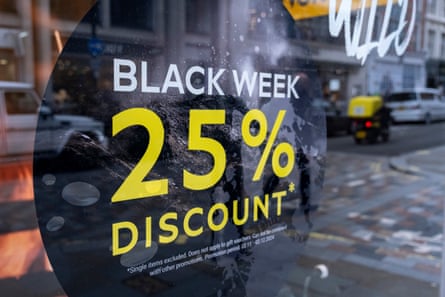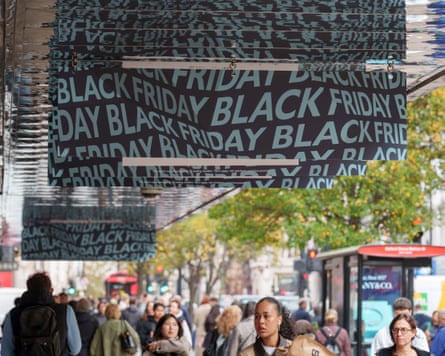PROTECT YOUR DNA WITH QUANTUM TECHNOLOGY
Orgo-Life the new way to the future Advertising by AdpathwayIt’s a difficult time for people who dislike Americana influencing British culture. Even if you’re able to ignore the culture war sailing across the Atlantic, we now have the double whammy of Thanksgiving and Black Friday being celebrated in the UK.
While the former may only have a small footprint in the UK, the latter is big business. In 2024, Britons spent £3.6bn between Black Friday and the retro-futuristically named Cyber Monday – a 5.2% increase on the previous year, despite (or perhaps because of) the ongoing cost-of-living crisis.
Still, even those of us who lament the never-ending drip-feed of commercialism and resent the very presence of Black Friday in the British lexicon can benefit from this particular capitalist jamboree. It’s just a case of playing it smart and focusing on what you need, rather than being seduced by offers.
Here are some tips on how to get through Black Friday feeling smug, rather than regretful.
Prep in advance

Decide what you actually want
If you’re braving the Black Friday sales, either in person or online, do so with a hitlist of what you actually need. It’s in every retailer’s interest to shove the “best” offers in your face to tempt you to spend more – and some of us just aren’t strong enough to resist the lure of the 50%-off sticker, no matter our best intentions.
The thing to remember is this: if you didn’t want the product before you saw it, you haven’t made a 50% saving. You’ve just spent 100% more than you’d originally planned.
Decide how much you’ll spend and stick to it
With retailers promoting offers everywhere you look, it can be easy to go overboard. A couple of bargain purchases and suddenly you’re overdrawn with a porch that resembles an Amazon warehouse.
Study your income and outgoings to figure out how much you can afford to spend. You can be a little flexible here if you’re shopping for Christmas presents and thus reducing your December outgoings, but don’t be too clever with the justifications: you’ll only end up hurting yourself.
Follow favourite brands on social media now
If there are specific brands you’re hoping to see in the Black Friday sales, it pays to follow them on social media right away. Not only will you hear about any big discounts firsthand, but you might also benefit from coupons, early-bird discounts and offers exclusively for followers. Yes, you’ll have to endure a bit of hard sell and some cringey corporate meme appropriation, but you can always unfollow when the deals season is over.
Prepare to go early (but not too early)
Black Friday, which this year falls on 28 November, is theoretically the day after Thanksgiving. In practice, however, shoppers’ appetite for sales has led to the festivities kicking off earlier – and finishing later. In other words, you should be alert to bargains ahead of time, just in case.
That said, shops will always have something up their sleeves to exclusively reveal on Black Friday itself, so it pays not to buy before the big day unless you’re absolutely certain that something better won’t come along (at the very least, make sure there’s a good returns policy, just in case). Some retailers, such as Currys and Richer Sounds, have a Black Friday price guarantee, where they’ll refund the difference if the price drops lower, which can give you a little more confidence.
Set price alerts
If you have a specific product in mind, you can track its price in real-time, helping you to strike when the time is right. The PriceRunner app lets you do this, saving you from checking dozens of listings manually.
On Black Friday itself

Ask why something is reduced
Black Friday sales can be disorientating. Not only is there a fixed time limit on discounts, but there’s also an implied scarcity of stock. There’s a pressure to act quickly – after all, nobody wants to be the fool who missed the great deal by being indecisive.
Stores prey on this, and it’s fair to say there are some (post-Thanksgiving) turkeys in the mix alongside the bona fide bargains. Perhaps the reason for the big discount is that the warehouse is chock-full of units they couldn’t shift at full price? Less cynically, maybe it’s that there’s a newer, better version that would suit your needs. Either way, it pays to …
Check the reviews – especially the one-star ones
Despite being the most popular retailer in the UK, the Amazon experience has seemingly worsened in recent years. One common issue is the sudden prevalence of gibberish manufacturer names producing very similar-looking products with suspiciously good reviews.
The fact that you’ve never heard of the brand may not be a red flag, though. If the product does the same thing as a well-known model and is available at a healthy discount, it may just be a savvy purchase.
The trick is to dig deep into those reviews – and not just the five-star ones, which have a history of being naughtily incentivised to boost their presence in the algorithm. Check the one- and two-star reviews as well, since this is where the gold lies. If you see a consistent thread of defects or a general sense of disappointment, then don’t take the risk, no matter how deep the discount.
Resist impulse buys
Sometimes, an offer will seem so appealing that your resolve is tested – even if it’s a product you’ve never needed before.
There’s nothing inherently wrong with that – I’ve often found myself persuaded of products’ merits by reading articles on the Filter – but today’s Black Friday impulse buy can very easily become tomorrow’s charity shop donation.
Slow down and ask yourself a couple of questions. First, “Why do I need this?” If you can’t answer or your answer isn’t convincing, then at least sleep on it.
Follow this up with: “Am I only interested because it’s cheap?” If so, remember you’ll save more money by closing the browser window.
after newsletter promotion
Is it really a deal?
You’ve decided it’s something you need, the reviews look good, and there’s no obvious reason for a sudden reduction. The next thing to ask is: “Is it really reduced?”, and if so: “From what?”
No, honestly – this isn’t a philosophical thought experiment designed to stop you from spending, it’s a literal question.
Retailers have a sneaky habit of listing the percentage reduction on the RRP rather than the selling price immediately before Black Friday. Even if they’re comparing the current price against their own, some shops inflate the list price to above its historic average shortly before the sales, so they can claim a bigger cut on the day itself.
Fortunately, you can fight back against this chicanery with a couple of free internet tools. The first, CamelCamelCamel, is specifically for Amazon shoppers. Just enter the product code into the search, and you’ll get a graph of historical pricing, letting you see if this is really a once-in-a-lifetime deal or just business as usual. If that’s too much effort, you can install the browser plugin to instantly reveal a price history in real-time as you’re browsing by clicking the camel next to the URL.
While not quite as user-friendly, both PriceRunner and PriceSpy have similar price history sections for non-Amazon retailers, so you can see if you have the best price now, and whether it’s been at this level before. Remember, if it has, there’s no need to feel rushed into a purchase.
Stick to reputable retailers
As well as being popular with retailers and shoppers, Black Friday is also regrettably popular with scammers. When people are racing to enter their credit card details to secure a bargain, they may be less inclined to check if the site is legitimate in the first place.
The best advice here is to stick to retailers that you’ve already heard of, or at least those with an online footprint going back a few years. Even then, if you are following links from other websites and social media, make sure that the site you’re on is the real deal, not a copycat designed to harvest credit card data (this is usually as simple as checking the URL).

Consider membership schemes
With subscriptions required for music, TV and even certain websites, you may resent the idea of paying retailers for a membership on top of the product itself, but it can pay to reconsider this instinct during Black Friday.
That’s because some deals (or all, in the case of Costco) are reserved for site members. Amazon Prime (£95 a year) is the most obvious of these, unlocking exclusive prices for members, along with free shipping and extras such as Prime Video, but there’s also AO Five Star (£39.99 a year) and the aforementioned Costco (£42 a year for online-only membership.
Sometimes, the price of the membership will be absorbed by the saving you’re making, so do the maths. Whichever you do take up, just remember to cancel before your first payment is due if you don’t want to keep it long term.
Check the returns policy
It’s easy to get caught up in a deals frenzy and end up with something you regret buying. For that reason, check the retailer’s returns policy before buying.
These may be more generous around Christmas, aware of the needs of those buying potentially unwanted gifts. But there are always caveats, such as products needing to remain unopened, so check the small print.
Don’t forget discount codes
Remember that you might be able to do better than the list price. Coupons can make an already discounted product even more appealing, so have a nose around and see what’s available.
Some retailers will offer a percentage off your first order just by signing up for a newsletter, for example, so shop around if the product has the same discount in multiple stores.
Remember refurbished
Shopping refurbished isn’t only better for the planet, it can also save you a fair few quid.
In recent Black Friday sales, Amazon has had a blanket code for various goods in its warehouse, so it’s worth checking to see if the same applies this year. Ebay often produces a discount code for selected products, too, so check the homepage for any refurbished goods from the big retailers.
Don’t discard, donate!
Finally, if you are replacing something in the sales, try to dispose of what you no longer need responsibly. You can sell it on eBay, Gumtree and Vinted, or donate it to friends, family or charity.
Try to avoid landfill, if possible: Black Friday sales aren’t great for sustainability, but you can at least lessen the damage by recycling and reusing where you can. If recycling is your only option, check Recycle Your Electricals for details of local recycling schemes.
For more, read do you really need to buy a new laptop? When to upgrade – and when to hold off and how to make your smartphone last longer
Alan Martin is a writer who has been putting products – including phones, gaming devices and wearables – through their paces for more than a decade


 2 hours ago
2
2 hours ago
2





















 English (US) ·
English (US) ·  French (CA) ·
French (CA) ·  French (FR) ·
French (FR) ·